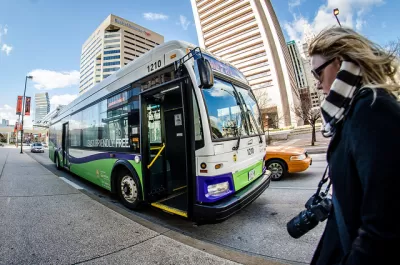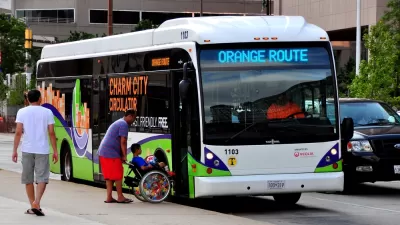A local bus and transit advocate pushes for more improvements to the Maryland Transit Administration's bus system in the city of Baltimore.

Danielle Sweeney checks in with the outcomes of BaltimoreLink, the first substantial redesign of Baltimore's bus system in 50 years, as implemented in June 2017.
According to Sweeney, the redesigned bus system promised "a high-frequency grid, dedicated bus lanes, and transit signal priority corridors that would dramatically improve service." Also, [t]he revamped system was supposed to give more Baltimoreans access to jobs and better connect residents of this high-poverty city to opportunities." Baltimore Mayor Catherine Pugh also "promised that BaltimoreLink would play a key role in the city’s future economic growth."
Initial findings, reported at the end of 2017 and again a year after the system opened, didn't exactly exude positive outcomes. Sweeney's current evaluation continues that theme:
Just before the bus reboot launched in June 2017, I started a Facebook group where riders could document their experiences with the new system. Before I archived it, after 15 months of comments, my group, “Where’s the Bus, Baltimore?” had more than 500 members, including MTA operators, management, and elected officials.
Overall, reviews of the new reboot have been less-than-stellar. Service quality has been all over the road, ridership is flat, and on-time improvements mixed. If you visit Charm City today, you’re likely to experience poorly enforced dedicated bus lanes, buses blamed for the city’s traffic problems, and riders complaining about no-show buses. Many of the dedicated lanes themselves are so faded they are almost invisible, and the MTA and Baltimore’s City’s Department of Transportation have yet to hammer out an agreement for maintaining them. So far, the so-called “transformative” bus system itself has few enthusiasts.
Sweeney provides additional details on the changes made by the BaltimoreLink redesign, a lot more data on whether the program achieved its stated goals, and opinions from local and national transit advocates on the current state of the system and how it could be improved.
FULL STORY: Hard Lessons From Baltimore’s Bus Redesign

Planetizen Federal Action Tracker
A weekly monitor of how Trump’s orders and actions are impacting planners and planning in America.

Maui's Vacation Rental Debate Turns Ugly
Verbal attacks, misinformation campaigns and fistfights plague a high-stakes debate to convert thousands of vacation rentals into long-term housing.

Cuomo Is the Candidate of Both NIMBYs and Developers. What Gives?
In the New York City mayoral race, odd bedfellows align to preserve the housing status quo.

The Subversive Car-Free Guide to Trump's Great American Road Trip
Car-free ways to access Chicagoland’s best tourist attractions.

San Antonio and Austin are Fusing Into one Massive Megaregion
The region spanning the two central Texas cities is growing fast, posing challenges for local infrastructure and water supplies.

Charlottesville Temporarily Has No Zoning Code
A judge ordered the Virginia city to throw out its newly revised zoning code, leaving permitting for new development in legal limbo.
Urban Design for Planners 1: Software Tools
This six-course series explores essential urban design concepts using open source software and equips planners with the tools they need to participate fully in the urban design process.
Planning for Universal Design
Learn the tools for implementing Universal Design in planning regulations.
Heyer Gruel & Associates PA
JM Goldson LLC
Custer County Colorado
City of Camden Redevelopment Agency
City of Astoria
Transportation Research & Education Center (TREC) at Portland State University
Jefferson Parish Government
Camden Redevelopment Agency
City of Claremont




























